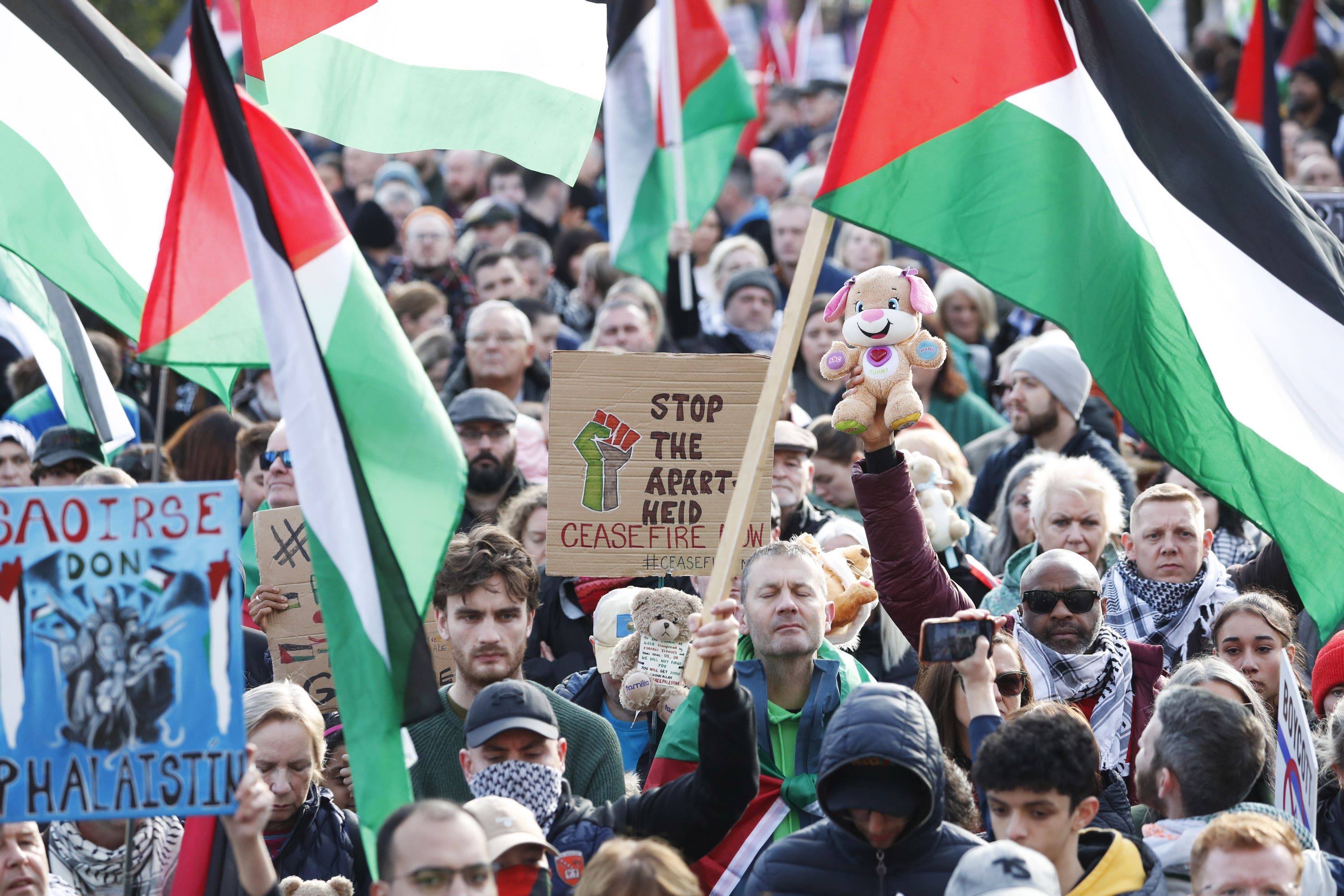Pressure on Met to ban ‘provocative’ Armistice Day pro-Palestine march
Downing Street said Rishi Sunak believes the protest planned for November 11 is ‘disrespectful’.

Your support helps us to tell the story
From reproductive rights to climate change to Big Tech, The Independent is on the ground when the story is developing. Whether it's investigating the financials of Elon Musk's pro-Trump PAC or producing our latest documentary, 'The A Word', which shines a light on the American women fighting for reproductive rights, we know how important it is to parse out the facts from the messaging.
At such a critical moment in US history, we need reporters on the ground. Your donation allows us to keep sending journalists to speak to both sides of the story.
The Independent is trusted by Americans across the entire political spectrum. And unlike many other quality news outlets, we choose not to lock Americans out of our reporting and analysis with paywalls. We believe quality journalism should be available to everyone, paid for by those who can afford it.
Your support makes all the difference.Rishi Sunak has heaped further pressure on Metropolitan Police chief Sir Mark Rowley to ban a “provocative and disrespectful” pro-Palestinian march on Armistice Day.
The Met has urged the march organisers to “urgently reconsider” the event in London on Saturday because of a growing risk of violence, but the pro-Palestinian coalition behind it have refused to call it off.
The Met could request the power to ban the event under Section 13 of the Public Order Act 1986, but that would only apply if there was the threat of “serious public disorder”, which could not be controlled by other measures.
The Prime Minister’s official spokesman said operational decisions on whether to ban the planned march in London were for the Metropolitan Police.
But the spokesman said the Government would “carefully consider” any application to prevent it.
“The Prime Minister himself does not think it’s right for these sorts of protests to be scheduled on Armistice Day,” the spokesman said.
“He believes that is provocative and disrespectful.”
The coalition of groups, which includes the Palestine Solidarity Campaign, Stop the War and the Muslim Association of Britain, insisted they would press ahead with the demonstration calling for an immediate ceasefire between Israel and Hamas in the Gaza Strip.
There are concerns that breakaway groups from the main march could look for trouble, while counter-demonstrations may also add to policing difficulties.
Far-right activist and English Defence League founder Tommy Robinson said “British men are mobilising for Saturday to be in London” in order to “show our government and show our police and show Hamas and everyone sitting around the world saying ‘Britain has fallen’ that there is a resistance”.
Veterans’ Affairs Minister Johnny Mercer urged former military personnel not to join protests and stressed that the route of the march was not due to go near the Cenotaph in Whitehall.
Mr Mercer, in a letter to Sir Mark, said he had spent the weekend “dissuading various veterans groups from organising marches or protests this Saturday”.
But he urged police to protect veterans who were marking the Armistice or Remembrance Sunday.
“I have particular concern towards our elderly veterans for whom travelling to London once a year is an important part of their Remembrance, and have expressed genuine fears to me around their ability to travel to London, particularly through our rail stations, unmolested,” he said.
His comments came after 78-year-old poppy seller Jim Henderson was allegedly punched at Waverley Station in Edinburgh during a pro-Palestinian rally, an incident described as “repulsive” by Downing Street.
The planned route for the march goes from Hyde Park – about a mile from the Cenotaph – to the US embassy in Vauxhall, south of the Thames.
Met Police Deputy Assistant Commissioner Ade Adelekan, who leads public order policing in the English capital, said on Monday: “The risk of violence and disorder linked to breakaway groups is growing.
“This is of concern ahead of a significant and busy weekend in the capital.
“Our message to organisers is clear: please, we ask you to urgently reconsider. It is not appropriate to hold any protests in London this weekend.”
Home Secretary Suella Braverman, who welcomed the Met’s statement, said that “hate marchers need to understand that decent British people have had enough of these displays of thuggish intimidation and extremism”.
Justice Secretary Alex Chalk distanced himself from her comments, making clear that he would not use the language of “hate marchers”, but insisting it did not signal “confusion” within Government.
“There is no doubt there are elements on these marches that I’m afraid are espousing hate… but equally, there will be those people who are there expressing their anguish at some of the untold suffering,” he told BBC Radio 4’s Today.
The organisers of the protest said they were “deeply concerned” by the Met statement and claimed the force could not provide “any evidence” for why the risk of breakaway groups engaging in criminal activity would be any greater.
The organisers added: “We recognise the political pressure being placed on the police by the Government and right-wing political groups.
“However, we emphasise that they had and have a responsibility to withstand that pressure and act to uphold democratic freedoms.”
The Festival of Remembrance at the Royal Albert Hall, which will be attended by the King and Queen along with other members of the royal family, will take place on Saturday, with a two-minute silence at 11am.
Remembrance Sunday events will take place at the Cenotaph in Westminster the following day.
Meanwhile, the Government believes there are three British hostages still being held by Hamas in Gaza.
More than 100 UK nationals who were in Gaza when the war broke out have been able to flee the territory through the Rafah crossing with Egypt.